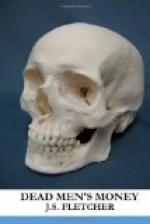“D’ye see that, now?” he murmured. “You’ll notice there’s some sort of a weapon penetrated there—penetrated! But the doctor can say more than I can on that point.”
“The man was struck—felled—by some sort of a weapon,” said the doctor. “It’s penetrated, I should say from mere superficial examination, to the brain. You’ll observe there’s a bruise outwardly—aye, but this has been a sharp weapon as well, something with a point, and there’s the puncture—how far it may extend I can’t tell yet. But on the surface of things, Mr. Lindsey, I should incline to the opinion that the poor fellow was dead, or dying, when he was thrown into yon pool. Anyway, after a blow like that, he’d be unconscious. But I’m thinking he was dead before the water closed on him.”
Mr. Lindsey looked closer at the mark, and at the hole in the centre of it.
“Has it struck any of you how that could be caused?” he asked suddenly. “It hasn’t? Then I’ll suggest something to you. There’s an implement in pretty constant use hereabouts that would do just that—a salmon gaff!”
The two police officials started—the doctor nodded his head.
“Aye, and that’s a sensible remark,” said he. “A salmon gaff would just do it.” He turned to Chisholm with a sharp look. “You were saying this man was suspected of poaching?” he asked. “Likely it’ll have been some poaching affair he was after last night—him and others. And they may have quarrelled and come to blows—and there you are!”
“Were there any signs of an affray close by—or near, on the bank?” asked Mr. Lindsey.
“We’re going down there now ourselves to have a look round,” answered Mr. Murray. “But according to Turndale, the body was lying in a deep pool in the Till, under the trees on the bank—it might have lain there for many a month if it hadn’t been for yon young McIlwraith that has a turn for prying into dark and out-of-the-way corners. Well, here’s more matter for the coroner.”
Mr. Lindsey and I went back to Berwick after that. And, once more, he said little on the journey, except that it would be well if it came out that this was but a poaching affair in which Crone had got across with some companion of his; and for the rest of the afternoon he made no further remark to me about the matter, nor about the discovery of the morning. But as I was leaving the office at night, he gave me a word.
“Say nothing about that will, to anybody,” said he. “I’ll think that matter over to-night, and see what’ll come of my thinking. It’s as I said before, Hugh—to get at the bottom of all this, we’ll have to go back—maybe a far way.”
I said nothing and went home. For now I had work of my own—I was going to what I had resolved on after Chisholm told me the news about Crone. I would not tell my secret to Mr. Lindsey, nor to the police, nor even to Maisie. I would go straight and tell it to the one man whom it concerned—Sir Gilbert Carstairs. I would speak plainly to him, and be done with it. And as soon as I had eaten my supper, I mounted my bicycle, and, as the dusk was coming on, rode off to Hathercleugh House.




